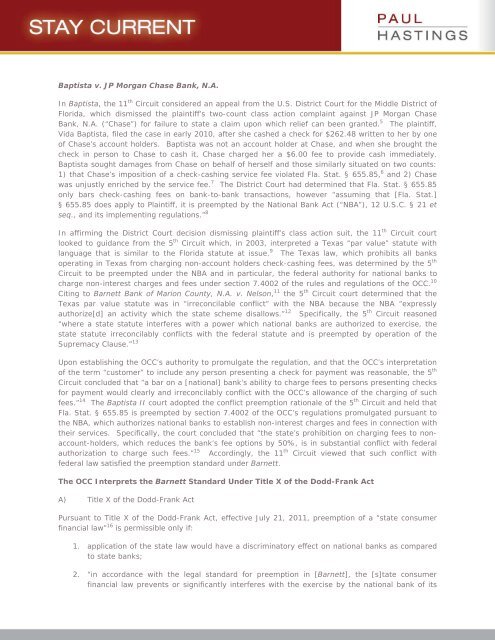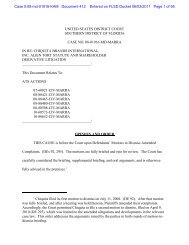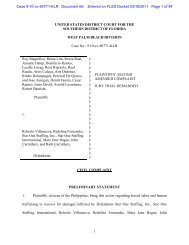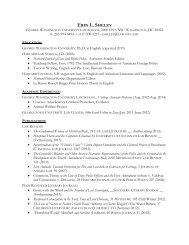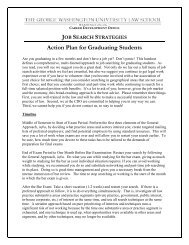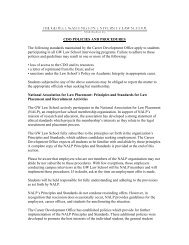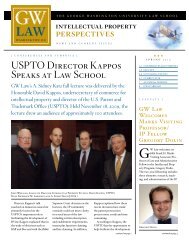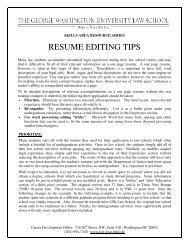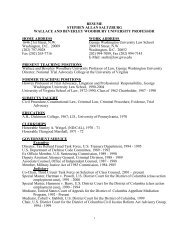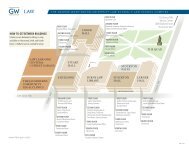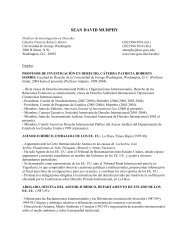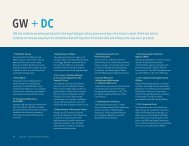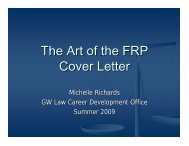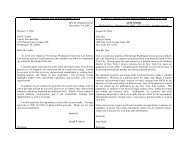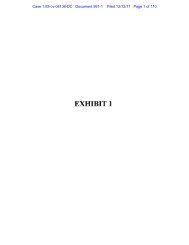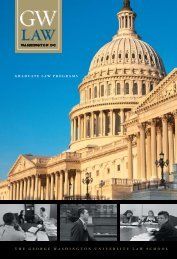CLE Materials for Panel #1 - George Washington University Law ...
CLE Materials for Panel #1 - George Washington University Law ...
CLE Materials for Panel #1 - George Washington University Law ...
You also want an ePaper? Increase the reach of your titles
YUMPU automatically turns print PDFs into web optimized ePapers that Google loves.
Baptista v. JP Morgan Chase Bank, N.A.<br />
In Baptista, the 11 th Circuit considered an appeal from the U.S. District Court <strong>for</strong> the Middle District of<br />
Florida, which dismissed the plaintiff’s two-count class action complaint against JP Morgan Chase<br />
Bank, N.A. (“Chase”) <strong>for</strong> failure to state a claim upon which relief can been granted. 5 The plaintiff,<br />
Vida Baptista, filed the case in early 2010, after she cashed a check <strong>for</strong> $262.48 written to her by one<br />
of Chase’s account holders. Baptista was not an account holder at Chase, and when she brought the<br />
check in person to Chase to cash it, Chase charged her a $6.00 fee to provide cash immediately.<br />
Baptista sought damages from Chase on behalf of herself and those similarly situated on two counts:<br />
1) that Chase’s imposition of a check-cashing service fee violated Fla. Stat. § 655.85, 6 and 2) Chase<br />
was unjustly enriched by the service fee. 7 The District Court had determined that Fla. Stat. § 655.85<br />
only bars check-cashing fees on bank-to-bank transactions, however “assuming that [Fla. Stat.]<br />
§ 655.85 does apply to Plaintiff, it is preempted by the National Bank Act (“NBA”), 12 U.S.C. § 21 et<br />
seq., and its implementing regulations.” 8<br />
In affirming the District Court decision dismissing plaintiff’s class action suit, the 11 th Circuit court<br />
looked to guidance from the 5 th Circuit which, in 2003, interpreted a Texas “par value” statute with<br />
language that is similar to the Florida statute at issue. 9 The Texas law, which prohibits all banks<br />
operating in Texas from charging non-account holders check-cashing fees, was determined by the 5 th<br />
Circuit to be preempted under the NBA and in particular, the federal authority <strong>for</strong> national banks to<br />
charge non-interest charges and fees under section 7.4002 of the rules and regulations of the OCC. 10<br />
Citing to Barnett Bank of Marion County, N.A. v. Nelson, 11 the 5 th Circuit court determined that the<br />
Texas par value statute was in “irreconcilable conflict” with the NBA because the NBA “expressly<br />
authorize[d] an activity which the state scheme disallows.” 12 Specifically, the 5 th Circuit reasoned<br />
“where a state statute interferes with a power which national banks are authorized to exercise, the<br />
state statute irreconcilably conflicts with the federal statute and is preempted by operation of the<br />
Supremacy Clause.” 13<br />
Upon establishing the OCC’s authority to promulgate the regulation, and that the OCC’s interpretation<br />
of the term “customer” to include any person presenting a check <strong>for</strong> payment was reasonable, the 5 th<br />
Circuit concluded that “a bar on a [national] bank’s ability to charge fees to persons presenting checks<br />
<strong>for</strong> payment would clearly and irreconcilably conflict with the OCC’s allowance of the charging of such<br />
fees.” 14 The Baptista II court adopted the conflict preemption rationale of the 5 th Circuit and held that<br />
Fla. Stat. § 655.85 is preempted by section 7.4002 of the OCC’s regulations promulgated pursuant to<br />
the NBA, which authorizes national banks to establish non-interest charges and fees in connection with<br />
their services. Specifically, the court concluded that “the state’s prohibition on charging fees to nonaccount-holders,<br />
which reduces the bank’s fee options by 50%, is in substantial conflict with federal<br />
authorization to charge such fees.” 15 Accordingly, the 11 th Circuit viewed that such conflict with<br />
federal law satisfied the preemption standard under Barnett.<br />
The OCC Interprets the Barnett Standard Under Title X of the Dodd-Frank Act<br />
A) Title X of the Dodd-Frank Act<br />
Pursuant to Title X of the Dodd-Frank Act, effective July 21, 2011, preemption of a “state consumer<br />
financial law” 16 is permissible only if:<br />
1. application of the state law would have a discriminatory effect on national banks as compared<br />
to state banks;<br />
2. “in accordance with the legal standard <strong>for</strong> preemption in [Barnett], the [s]tate consumer<br />
financial law prevents or significantly interferes with the exercise by the national bank of its<br />
2<br />
2


